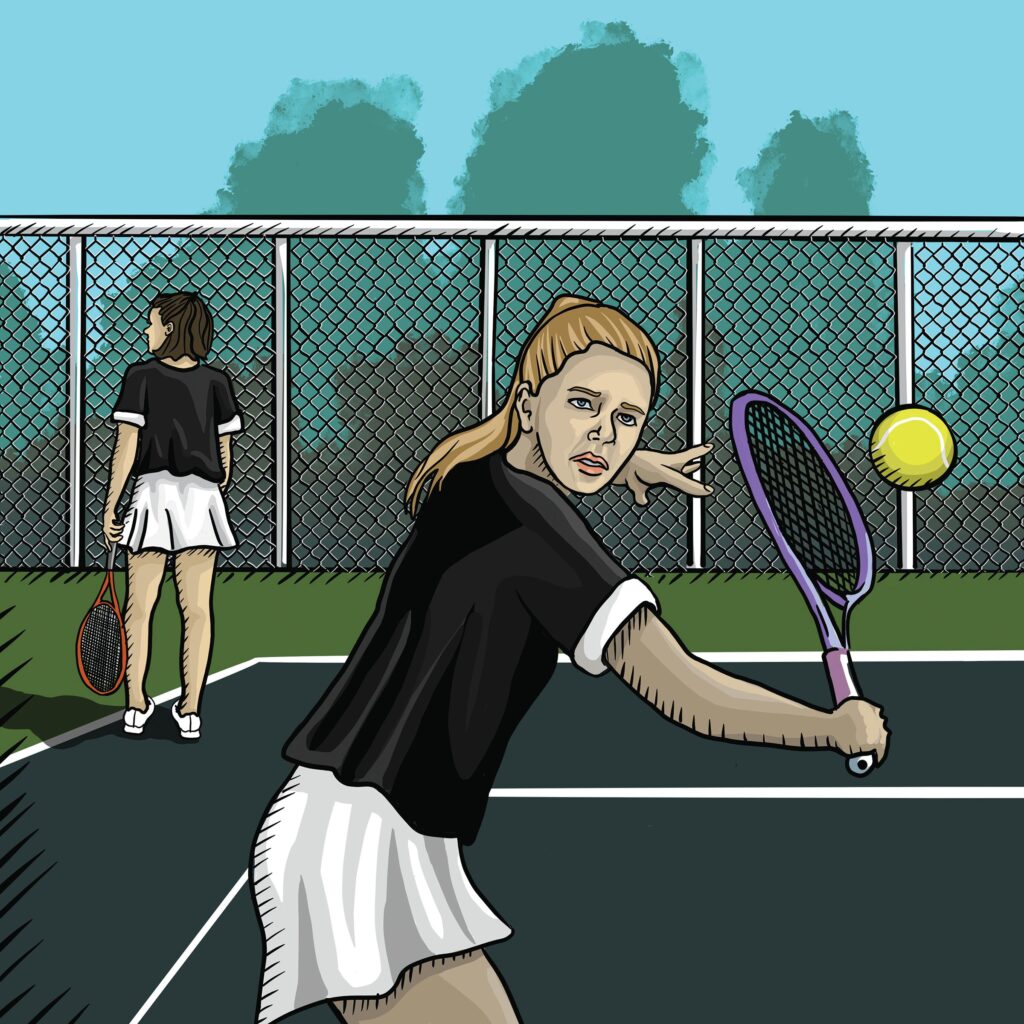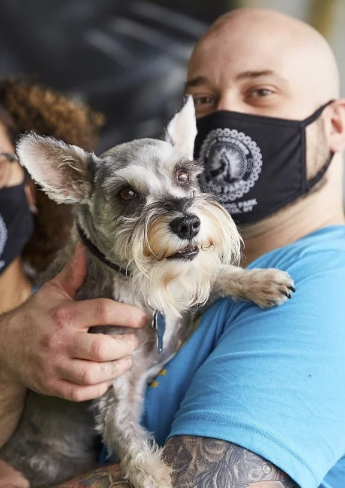
It’s one of those fall days where leaves cover the ground, but the afternoons are still hot. I’m courtside, watching an outdoor tennis match with the players locked in an endless volley. Just when you think the point is over, a racquet comes out of nowhere to intervene. I’m so invested that I barely notice a second tennis ball bounce into my foot. My doubles partner, Kate, stands in front of me, gasping for air. I turn around and see a different tennis court; the one that—whoops—I’m supposed to be playing on. I was so caught up in the other match, I missed the start of my own. My body was aimed in the wrong direction for the duration of our first point, leaving Kate under siege. Our opponents peppered her with returns as she dashed from the net to the baseline and back again, wondering where I was. By the time I came back online, she was hot with annoyance: “I PLAYED THAT WHOLE POINT WITHOUT YOU!” Yikes. How to respond to such vehemence? I opted for enthusiasm: “And you did a great job, buddy!”
Such were the antics of our high school tennis team during my tenure. I’m not sure what propelled me to join tennis; I was not much of an athlete and had never held a racquet. Kate was the only person I knew on the team, so I asked her about tryouts and the overall vibe of the team. She made it sound very nonthreatening; just what an athletic wallflower like me wants to hear. I dug out one of my dad’s old racquets from the basement and headed to tryouts. The racket was wooden, larger than a shovel, and obviously designed before aerodynamics were invented. It probably hadn’t seen a tennis court since the days of Rod Laver. Rod who? Exactly.
Tryouts were not very competitive: Tennis was the lowest ranked sport at our school, and our coach actually specialized in baseball. It was no surprise that I and my Nixon-era racket made the team.
The end of summer can be a melancholy time for kids as the weather turns cold and school begins. But to me, changing leaves signaled the start of our season. Shortly after I joined the team, our coach paired me with Kate as a doubles team. We went 12–4 in our first season together, and I was awarded Most Promising Player. I’d done so well that my parents bought me professional lessons for Christmas. I learned proper techniques for grip, racquet preparation, and footwork. I was happy to learn more about tennis, but it was the team I loved, because we always had fun. We were a ragtag group of girls just trying to stay humble. That was easy, because our school didn’t even have a proper tennis court. We had to beg, borrow, and steal time on any public court available. During practice, boys from rival schools jogged around us shirtless while they ran track. We all stopped and stared, oblivious to coaches’ efforts to keep us focused. If Coach ran late, the school janitor drove us to games. We asked him for a pep talk, and he offered what he could: “Ladies, make sure you hit the balls on the court.” We cheered as if he was Vince Lombardi himself, then ran off the bus to certain annihilation.
My second year on the team, Kate and I won most of our matches. Our coach nicknamed us “The Franchise.” We qualified for the doubles team sectional by the skin of our teeth. Coach was so proud—Kate and I were the first girls in school history to go to sectionals for an individual event. As we pulled into the parking lot, Coach thought it would be fun to drive around in circles and taunt our opponents. But, reality hit fast. As the lowest seed, we faced the toughest team in the league and were eliminated before Coach put the bus in park.
In my senior year, my younger sister joined the team. At that point, Kate and I were team captains and my sister listened on the court as well as she did at home. One day, she refused to take my direction at practice, and everything boiled over. We had an on-court brawl in front of the entire team. We screamed obscenities at one another while I sent serves into her body. She ripped off her shirt during the scuffle and stomped around in her sports bra. Antics that would’ve had us ejected from Wimbledon immediately.
At the high school level, we kept our own score and yelled it out before serves. If my opponents mistakenly announced me to be in the lead, I corrected them immediately. Coach would clench his jaw. “TAKE THE FREEBIE! You’re TOO honest!” On the bus, girls giggled and gossiped about the latest exploits of our classmates. Coach always tried to make me spill the tea on my friends, but I never cracked. Coach would chuckle. “You’re a good person, T!” He often commended me for how well I looked after my sister, though she didn’t make it easy.
By senior year, I considered Coach to be a real mentor, so I asked him for a college recommendation letter; it seemed he remembered those little moments, too. One line in his second paragraph stopped me in my tracks. “Her high morals and sense of integrity are unparalleled.” All the other letters focused on how I would benefit the school academically. Coach’s letter was the first time someone acknowledged how thoughtfully I moved about the world, and I felt seen.
I was lucky enough to have a sports experience defined not by big wins but by smaller, more meaningful moments. While tennis connected me to other people, it also refined my sense of self. The team I joined on a whim ended up a defining part of my high school years.
This article originally appeared in the September/October 2024 issue of (585).
Views: 18






